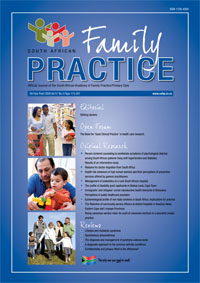Management of Snakebites at a Rural South African Hospital
Keywords:
snakebite, rural, South Africa, hospital, antivenom
Abstract
Background: Snakebites remain a source of considerable morbidity and mortality in many countries with an estimated global true incidence of envenomation exceeding five million per year, with about 100 000 of these cases developing severe sequelae. Despite the availability of polyvalent snake antivenom, inappropriate first aid, the regional effects of envenomation, and inappropriate use of antivenom result in significant and at times potentially avoidable, morbidity and mortality – particularly in children. The study was undertaken in Ellisras (now Lephalale) hospital, Limpopo province due to the frequency of snake bites managed at the hospital. Methods: This was a record–based retrospective study in which patient files with the diagnosis of snake bite were reviewed. The objective of this study was to document the management of snakebites at Ellisras (now Lephalale) hospital, Limpopo, a rural hospital in South Africa. The hospital files of all patients managed at the hospital for snakebites from 1 January 1998 to 31 December 2001 were reviewed. Results: Seventy patients were treated for snakebites during the study period. The results showed a male preponderance (60%) and a mean age of 27.3 years among the reported cases managed for snakebites. Twenty-nine patients (41.1%) were bitten between dusk and dawn (18h00 and 06h00), 43 (61.4%) were bitten on the lower limb and the mean duration of admission in the wards was 4.2 days. Twenty-one bites (30%) were attributed to known poisonous snakes, 22 (31.4%) received polyvalent antivenom, 42 (60%) received promethazine which has not been shown to prevent anaphylactic reactions, 12 (17.1%) developed complications, and 2 died (case fatality rate of 2.9%). Conclusion: The findings of this study highlight gaps in the management of snake bites at this rural hospital where they occur frequently. It is crucial for primary care physicians to be familiar with the most common venomous snakes in South Africa and the management of their bites in humans. The importance of administering prophylactic antibiotic, tetanus toxoid in all confirmed snakebites, and close monitoring of all patients during and after antivenom administration form the basis of most clinical protocols on the management of snakebites.
Published
2009-04-25
Section
Original Research
By submitting manuscripts to SAFP, authors of original articles are assigning copyright to the South African Academy of Family Physicians. Copyright of review articles are assigned to the Publisher, Medpharm Publications (Pty) Ltd, unless otherwise specified. Authors may use their own work after publication without written permission, provided they acknowledge the original source. Individuals and academic institutions may freely copy and distribute articles published in SAFP for educational and research purposes without obtaining permission.

